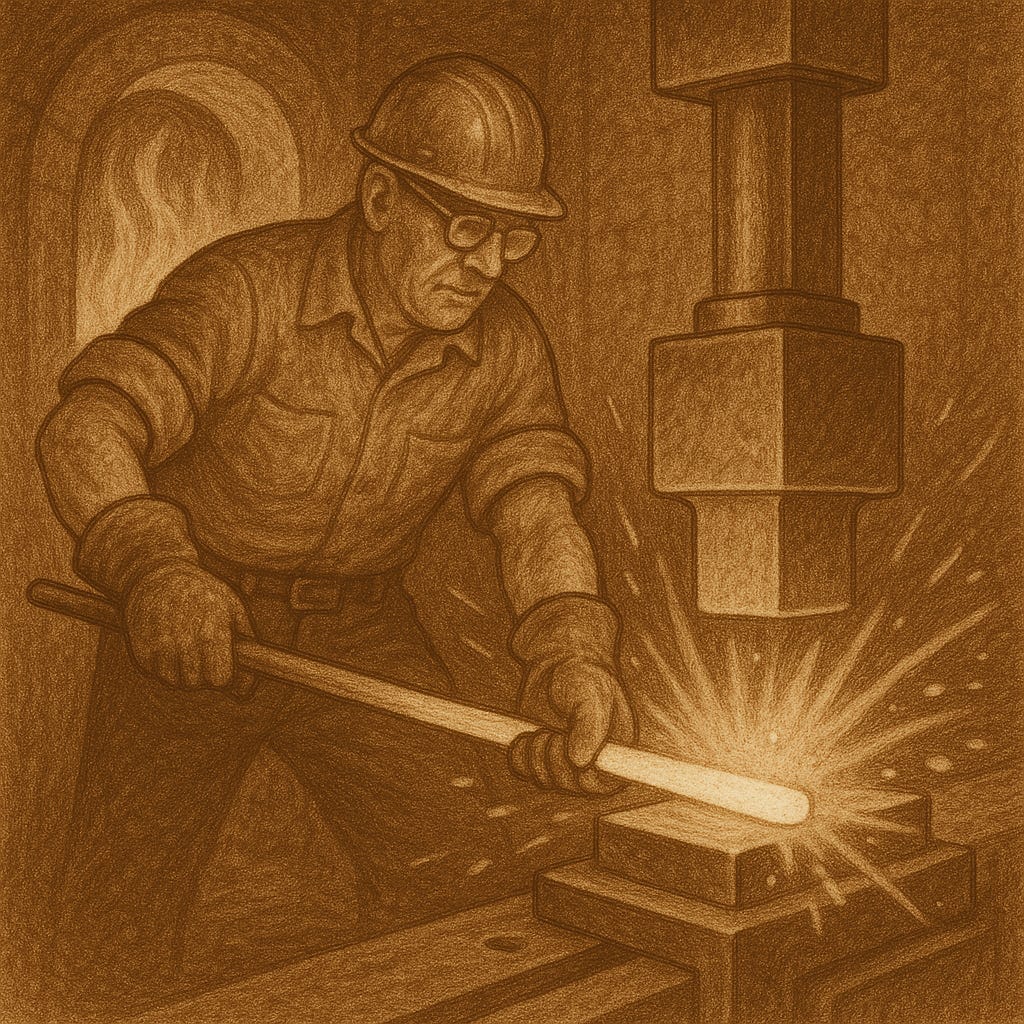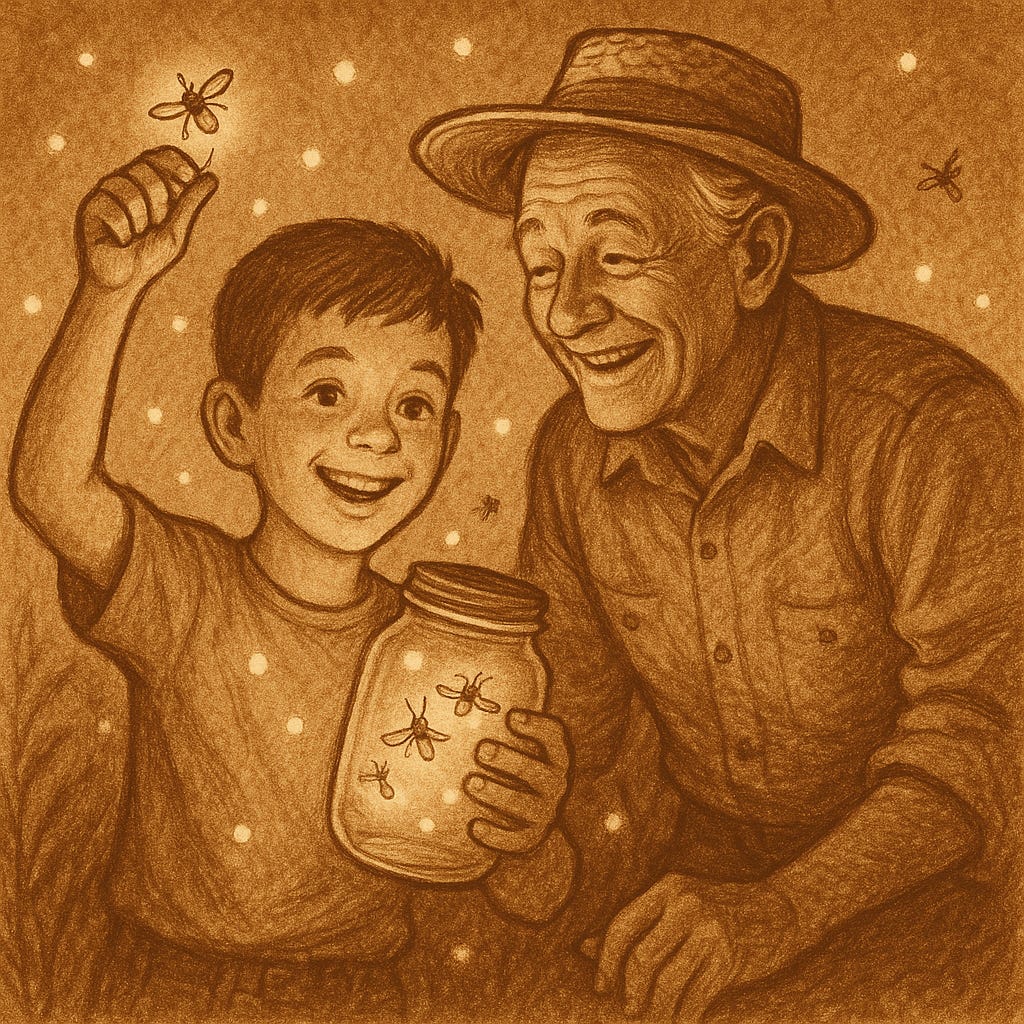Making the Best of It
#10 in the series, "A Legacy of Stories." Written by my dad, Forest Jordan
(Read about A Legacy of Stories, here.)
“You’re lookin’ at a real man there,” Fred said. “That was about 1942.”
It is 35 years later, and Fred is holding a snapshot of himself, squatting on his haunches, his muscular arms circling his eldest daughter, Virginia.
“At that time I was working the heat treating furnace,” he continued, “and the Dutchman, my partner, was running the drop forge.”
Fred is a boisterous, hard-working foundryman and proud of it. Proud of the hard work, a man’s work, the kind of work he had always known. He is the youngest of seven children who grew up on the farm. In the summer he and his brothers worked the fields, in winter they cut firewood for their own use and to sell.
My first memory of him was in the early thirties. He was courting my eldest sister, Julia. He would tolerate a little twerp like me and tumble me around which I liked a lot.
He and Julia married in 1933. Fred was a farm worker that year. He was trying to get factory work, but jobs were scarce. In fact, he and Julia moved in with us for a time one winter.
“Nothing makes a man meaner than being out of work,” he said.
Things got better for him. By 1937, Fred had a steady job in a foundry. I was staying with them that summer while my mother worked in the kitchen at a lakeside resort. Fred took me down to the steel mill one Sunday and showed me his job.
He worked before a great furnace. He fed long steel rods into the furnace where they reached 2000 degrees and the ends became white hot. Then with heavy gloves he would manhandle a rod over to the drop forge and lay it on a die.
“The operator trips a lever and a one-ton block of steel drops down to flatten hot steel into the die,’’ he explained. Molten metal spatters.
“See that,” he says showing me scars on his arms.
Fred and Julia lived two miles from the mill. At night I could hear the hammer banging. Fred stuffed cotton in his ears. Eventually he wore a hearing aid to pick up the higher register sounds. Working in front of the furnace, Fred wore long heavy woolen undershirts even in the summer against the heat and the air at the mill was full of smoke and cinders..
“A foundry is about as close to hell as you can get,” he said
It was the sort of work not many would or could do and the pay was therefore good.
Work at the drop forge slacked off after World War II and Fred and Julia moved to a farm for about a year. Then Fred found work in a foundry again as a molder. He shaped molds out of sand mixed with molasses. Molten steel was poured into the molds to make truck housings or giant valves, that sort industrial equipment. It was hard, dirty work again, but it was steady and he could feed the growing family of five children. And Fred was one of those fortunate people who could leave the job at the plant and go home to a happy, wholesome life.
He and the family now lived in a large, rented house set back amid tall oaks. There was a lake just across the road with good swimming and fishing. It was a great place for Sunday family gatherings and Fred was the liveliest person present. There were ball games, water fights, swimming and fishing and cards in the evening.
Then there was some rough humor. At one time he drove a ’29 Dodge. He hot-wired it off the coil. If you walked up to the car and leaned on the window to talk, he would turn on the ignition and give you a pretty good jolt. Once at my home, some of us took it further. Three or four held hands and then one would touch the car while we tried to see how long we could stand it. If you were last in line, you seemed to get it the worst and you just had to jump up and down until you let go.
There was the time our cat walked under the car and Fred gave him a shot. Well grounded by four legs, it’s a wonder it didn’t kill him. He shot around the corner of the garage and through a hole in the window. As long as Fred owned the car the cat disappeared for the day when he drove up.
A small pin oak grew at the back corner of our lot and Fred said, “see those two limbs? they make a Y. We can make a big sling shot.”
So that’s what we did. We cut two strips of inner tube about two inches wide and two feet long. A piece of leather served as the pocket. We fastened it to the branches and began with sending up small handmade parachutes. That was kind of fun . . . until we thought about Pegleg. He was plowing nearby, about a block away across a big vacant lot. We gathered some rocks half the size of an adult’s fist and dropped one about 30 feet away from him. He stopped the horse and looked up in the air and all around. We lofted a few more and continued to confound him until we thought we had better quit before the fun got serious.
Another of Fred’s cars was a Model T coupe. One winter day I went for a spin, literally, with him on the mill pond. He would get up speed and then turn the wheel, and we would spin round a few times on the ice. Great fun.
Quick with a joke and quick with a prank, that was boyish side of him. Good husband, good father was another side. When the children began to enter high school, the family moved into town. Fred drove the 25 miles to work and back over country roads each day; and as if work in a foundry wasn’t enough, he helped to build a church. Julia has always been a religious person and Fred went along in this I think mainly because religious principles fit in with the way he figured people ought to conduct their lives.
After retirement, with the children out of the house, Fred and Julia traveled about the country visiting friends and relatives. They had to give this up when Fred began to show signs of dementia. He also suffered silicosis from the long years working in the sand and dust of a foundry core room and then became disabled by a stroke. He died in 1995 at the age of 85.
“Fred led a good life. He was a good provider and did the very best he could with a limited education,” Julia said later. Herself a teacher, Julia told of his schooling. He went to a country school under the stern hand of a man who had little education himself, who saw his job mainly as keeping a bunch of rough country boys in line. Fred’s education was not much beyond the second-grade level though he was blessed with native intelligence.
He was a generous, steady man of good will, who could separate his hard work from his warm, loving family life.
Forest Jordan
Nov. 27, 2000
A personal note about my uncle Fred. I met uncle Fred during our 1975 road trip from Long Beach, California to Dowagiac, Michigan, where we stayed with aunt Julia and him for a couple weeks. He’s one of those people who leaves a lasting, wonderful impression on you - regardless of how brief your interactions. My dad’s description of “Quick with a joke and quick with a prank” is so true. He loved joking around with me, and did so from the very first time he saw me. He was 65 in 1975, but had the vigor of someone half his age. He showed me how to catch fireflies outside their house and let me borrow their adult tricycle, which I managed to get up on two wheels by cornering hard and twisting the handlebars just right. It wasn’t quite as thrilling as doing a wheelie, but it was close, and Fred, being somewhat of a daredevil himself, cheered me on. He had endless jokes and was one of the most entertaining and fun-loving people I’d ever met.
I’m glad to have discovered this story, as I didn’t know about his early years working in the foundries. Of course my dad had told me about his pranks - some of the best stories my dad told me over the years had, at least, a cameo appearance by Fred Culver.
Further notes:
A quick Google search uncovered this tidbit that was new to me: According to a church history compiled by Betty J. Ross, Sister Lakes Community Church originated with two families, Lee and Phyllis Stilwell and Fred and Julia Culver. The first service took place June 6, 1954, in Stilwell’s back yard, with Robert Weiss, accompanied by his wife, Norma, agreeing to pastor the new evangelical Bible-believing church.



